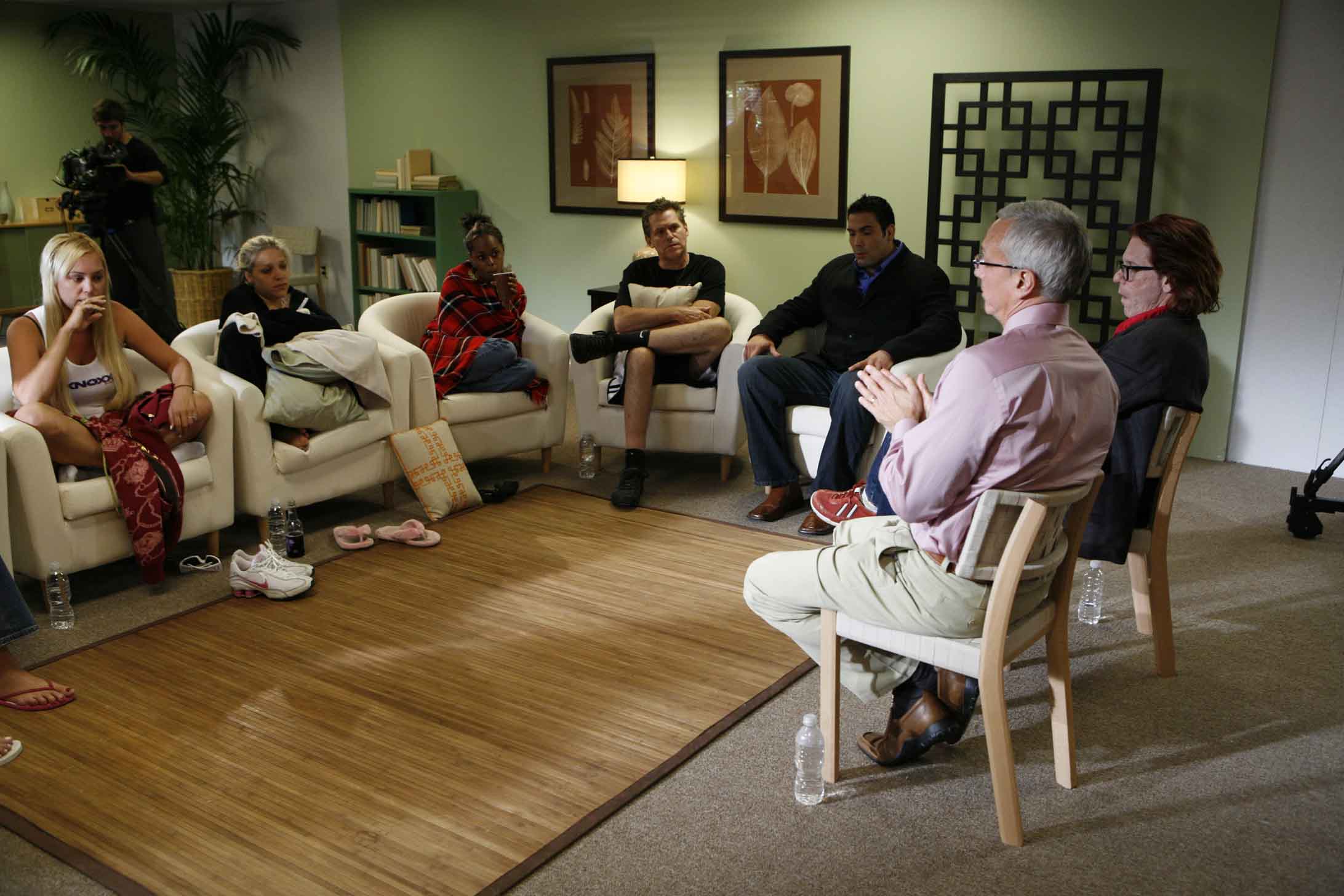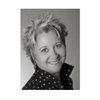Dr. Drew Pinsky One-on-One: How Real Is "Celebrity Rehab"? (Hint: No spa treatments allowed)
By Elaine Liner Elaine Liner Archives

The title of the show, Celebrity Rehab with Dr. Drew (premiering at 10 p.m. ET, Thursday, VH1), comes loaded with possibilities. Given cable’s recent track record with reality shows revealed to be scripted, deceptively edited and cast with “characters,” this one could easily have turned into another cheap hype job exploiting the shady behavior of camera-craving participants.
But the name in the title belongs to the real star of this eight-part series, Dr. Drew Pinsky, the board-certified addiction specialist and still-practicing physician who until now has been most famous for dispensing frank sex advice to anxious teenage callers late-nights as host of the nationally syndicated Loveline radio show.
It’s Pinsky’s participation on and off-camera in the new VH1 show that makes this series one of the most raw, compelling and honest looks at the tragic consequences of substance abuse--and the hard work it takes to conquer it--ever put on television. His presence adds a much-needed dose of integrity to the proceedings, even when the celebs involved threaten at times to run it off the rails.
Pinsky is the real deal, working with addicts every day as top doc at a treatment center in Pasadena, California. The 49-year-old USC med school grad has written books about addiction and abuse, and published a research study of celebrity narcissism. In recent weeks he’s become the go-to doc in the infotainment biz for comments about the deteriorating state of all things Britney.
But you won’t find him trying to ambush the frazzled pop princess in a hospital room à la Dr. Phil. Pinsky’s a by-the-book guy whose strong ideas about the right ways to treat addicts, famous or not, come through clearly in Celebrity Rehab. His regimen condones no coddling, no excuses and no fancy spa treatments. Even better: No self-aggrandizing on the part of the doctor.
In the no-frills Pasadena clinic where the series was filmed round-the-clock documentary-style over 21 days last August, Pinsky and a small staff of counselors and medical professionals guided nine celeb addicts through an intensive program of recovery. In the first two episodes, the ravages of drug and alcohol abuse are evident in each case. Actor Jeff Conaway arrives so drunk and drug-addled, he’s drooling and delusional. Porn star Mary Carey checks in drunk, too, and has to be warned about overt sexual behavior toward another of the celeb addicts, young rock musician Seth “Shifty” Binzer, a five-time rehab dropout whose drug of choice is crack. Brigitte Nielsen, Joanie “Chyna” Laurer, sitcom actress-turned-porn performer Jaimee Foxworth, Ricco Rodriguez and Jessica Sierra endure the shakes, sweats, DTs and nausea of 48 hours of “detox,” the first hurdle toward sobriety. Actor Daniel Baldwin, who’s fought drug addiction since the 1980s, arrives clean and sober, but Pinsky hints that problems emerge toward the later stages of treatment.
In this one-on-one interview, Dr. Pinsky talks about his troubled celebrity patients and their motivations for putting private pain on public view. He also reveals here exlusively what he’s had to sacrifice to keep Loveline, heard on 100 radio stations, on the air.
TV Maven:How real isCelebrity Rehab?
Dr. Pinsky: It’s very real. It’s basically showing how treatment works. This is treatment, just documented treatment. The only thing unusual or different about this situation is that we had nine people simultaneously coming in. Usually we have old-timers who are already in treatment who are there to help the newcomers. We had nine addicts hit the ground running in a new program. That’s not how it usually is.
TV Maven:Were you convinced that the motivations of your nine celebs were for real? Some participants in the show seem to be as addicted to celebrity as they are to drugs....
Dr. Pinsky: Clearly Jessica [Sierra] and Seth [Binzer] were down-and-out severe drug addicts desperate for treatment and glad to have it. Chyna and Jaimee, even they were not so sure at first. The motivations these people have are all somewhat different. Usually people heading into treatment are afraid they’re going to die. Others are afraid of the legal system. A sub-discipline of my field is trying to create motivation in drug addicts. For the show, I was able to work more intensely with them than I normally am. Usually if you stress an addict, you’ll have problems. But these people all hang on to the end. Some of them were really transformed.
TV Maven:Just some?
Dr. Pinsky: In Daniel [Baldwin] some things happen later on in the series that will surprise you. But Brigitte [Nielsen] is still sober and not drinking or smoking. Seth is now in a sober living facility and has been since the show ended.
TV Maven: Post-rehab, Jessica Sierra relapsed and ended up in jail. You’ve since helped get her transferred from a Florida jail to your treatment facility in Pasadena for a year to serve out the remainder of her sentence while working on sobriety. What happens to her on the show is quite dramatic in terms of what’s revealed about her family background. Very painful….
Dr. Pinsky: Jessica worked hard in treatment and it just wasn’t enough…I’m just glad she’s alive…she was on the streets when they picked her up.
TV Maven:Did you choose the celebrities for treatment initially?
Dr. Pinsky: No, the producers picked the people. I told them whether it was possible or appropriate in each case. Some people we looked at were too sick and needed hospital treatment.
TV Maven:If you do another season ofCelebrity Rehab, is there anything you’d do differently?
Dr. Pinsky: Not really. If once this thing is aired and it has not been harmful, I would be willing to contemplate a second one. But I’d beef up the staff. We were all burned out by the end. And one thing you don’t see on TV is that we were very careful to not discuss the 12-step process too much on camera. We keep that off-camera to protect the “anonymous” part of it. That made for a little bit of slipping and sliding with patients’ willingness to do the steps. Next time they would have to make all the meetings we ask them to make.
TV Maven: When does your fame get in the way of your doing medicine?
Dr. Pinsky: When you’re working with drug addicts, it does take a lot of energy and time away from doing medicine. Back when I first started Loveline[1982], I thought I’d do this media thing here and there and practice medicine full time. Around 1997 I decided I could use media to do something good. The more attention I paid to it, the more time it took away from doing medicine. Addicts sometimes use that [his fame] as a way of driving a wedge into my position of authority.
TV Maven:To borrow a question you frequently ask onLoveline: What IS wrong with the world that so many people are broken, addicted and depressed?
Dr. Pinsky: What I always get to is their childhood experiences. We have seriously disturbed families. That’s the bottom line here: People having screwed-up kids.
TV Maven:In your media work, you have become a father figure for a couple of generations of troubled young people. OK with that?
Dr. Pinsky: I look at that as a blessing. I think it’s a better sign that they’re looking to me than to Axl Rose. I always thought when I was on MTV that I was a guy with white hair doing this…look, it’s a good sign to me that they welcome me in. I’m very grateful to work with young people.
TV Maven:Even while promotingCelebrity Rehab, you’ve kept up a grueling schedule that includes your medical practice, scads of media interviews about the Brit mess, a working vacation to NYC with your wife and your 15-year-old triplets, plusLoveline live for two hours at midnight Pacific time and now a new daytime radio show,Dr. Drew Liveon Los Angeles station KGIL-AM (which also podcasts and livestreams the show). Ever get tired of talking?
Dr. Pinsky: I do get a little tired these days. But I love the challenge. I was not by nature a verbally gifted individual by any stretch before I started doing all this. I like challenges.
TV Maven:Why do another radio show? Are you hoping to syndicate the daytime show nationally, too? Like, you need another job?
Dr. Pinsky: I did not want to do it at first. Let’s just say I was convinced to do it. It was a way to make sure Loveline keeps going. But I’m really enjoying it. I’m truly enjoying it. The opportunity developed. My long-term goal is to go to daytime, but for now it’s a way to make sure Loveline stays on the air.
TV Maven:Thanks, Dr. Drew.
Dr. Pinsky: Talk to you soon.


